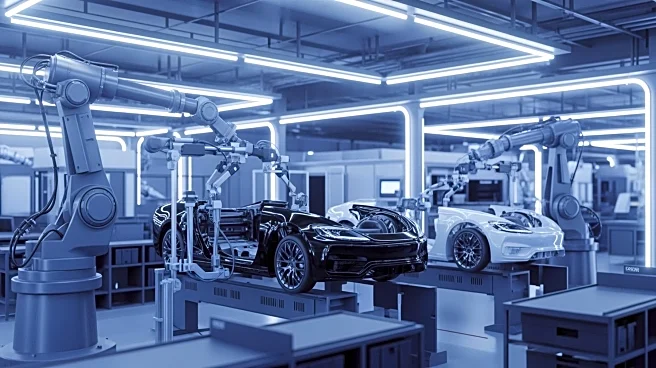What's Happening?
Tesla CEO Elon Musk announced that the production of the Cybercab, Tesla's autonomous robotaxi, will begin in April 2026. This announcement was made during Tesla's annual shareholder meeting, providing a more precise timeline than previously indicated.
The Cybercab is designed for autonomous operation, featuring Tesla's Full Self-Driving hardware and a cabin without a steering wheel or pedals. Tesla also unveiled its unboxed manufacturing line, which builds major vehicle sections in parallel, reducing factory footprint and production costs. This innovative approach aims to achieve rapid production speeds, potentially allowing a unit to be produced every five seconds.
Why It's Important?
The Cybercab represents a significant advancement in autonomous vehicle technology, potentially transforming the ride-hailing industry. Tesla's unboxed manufacturing process could revolutionize automotive production, offering efficiency and scalability benefits. The introduction of the Cybercab aligns with broader trends towards automation and sustainable transportation solutions. As Tesla continues to innovate, competitors may face pressure to adopt similar technologies, impacting the automotive industry's landscape. The production of the Cybercab could also influence public policy discussions on autonomous vehicles and their integration into urban transportation systems.
What's Next?
Tesla's focus will likely be on ramping up production capabilities and ensuring the Cybercab meets regulatory standards for autonomous vehicles. The company may engage with policymakers to address legal and safety considerations associated with autonomous ride-hailing services. As production begins, Tesla's competitors may respond with their own advancements in autonomous technology, potentially leading to increased market competition. The success of the Cybercab could pave the way for further developments in Tesla's autonomous vehicle lineup, influencing future transportation models.
Beyond the Headlines
The Cybercab's production raises questions about the future of employment in the transportation sector, as automation may reduce the need for human drivers. Ethical considerations regarding data privacy and security in autonomous vehicles will be crucial as these technologies become more prevalent. The shift towards autonomous transportation may also impact urban planning and infrastructure development, necessitating adaptations to accommodate new mobility solutions.
















